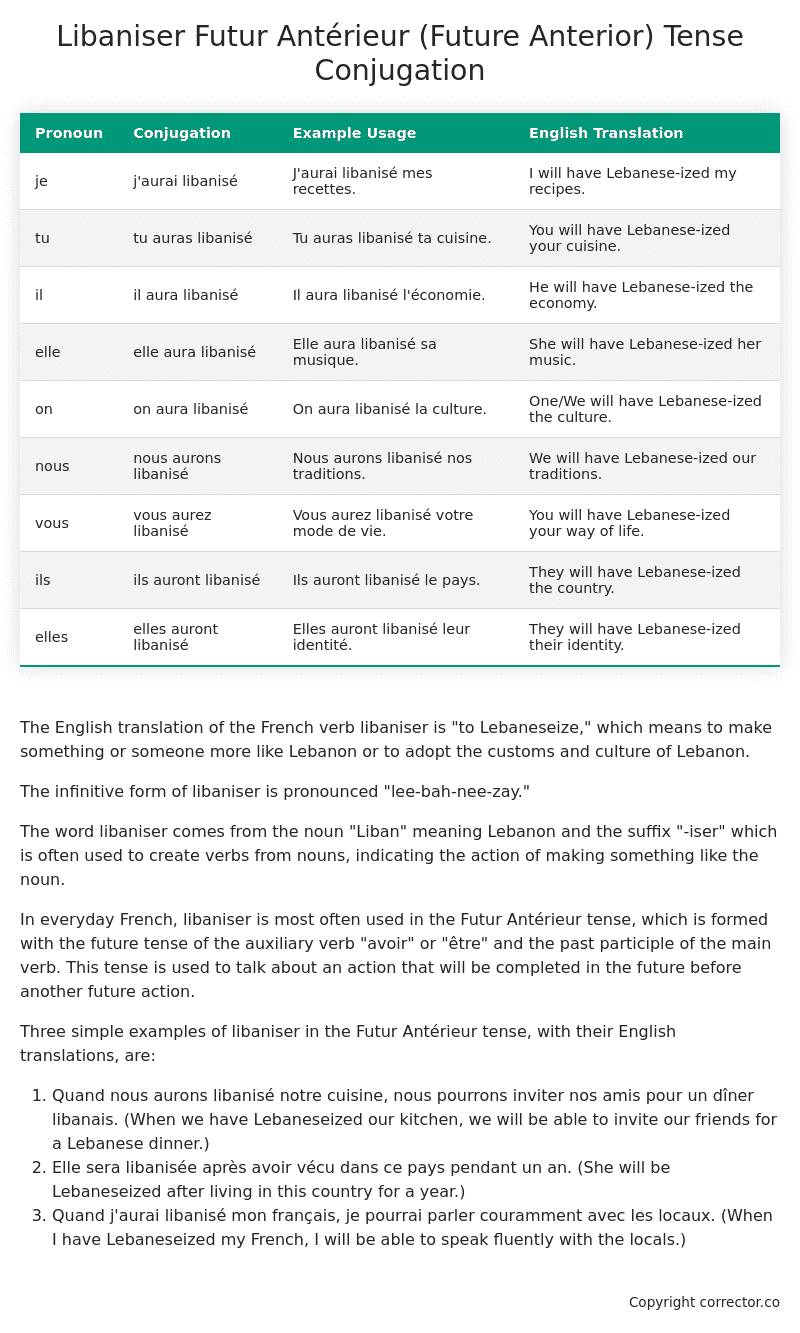Futur Antérieur (Future Anterior) Tense Conjugation of the French Verb libaniser
Introduction to the verb libaniser
The English translation of the French verb libaniser is “to Lebaneseize,” which means to make something or someone more like Lebanon or to adopt the customs and culture of Lebanon.
The infinitive form of libaniser is pronounced “lee-bah-nee-zay.”
The word libaniser comes from the noun “Liban” meaning Lebanon and the suffix “-iser” which is often used to create verbs from nouns, indicating the action of making something like the noun.
In everyday French, libaniser is most often used in the Futur Antérieur tense, which is formed with the future tense of the auxiliary verb “avoir” or “être” and the past participle of the main verb. This tense is used to talk about an action that will be completed in the future before another future action.
Three simple examples of libaniser in the Futur Antérieur tense, with their English translations, are:
- Quand nous aurons libanisé notre cuisine, nous pourrons inviter nos amis pour un dîner libanais. (When we have Lebaneseized our kitchen, we will be able to invite our friends for a Lebanese dinner.)
- Elle sera libanisée après avoir vécu dans ce pays pendant un an. (She will be Lebaneseized after living in this country for a year.)
- Quand j’aurai libanisé mon français, je pourrai parler couramment avec les locaux. (When I have Lebaneseized my French, I will be able to speak fluently with the locals.)
Table of the Futur Antérieur (Future Anterior) Tense Conjugation of libaniser
| Pronoun | Conjugation | Example Usage | English Translation |
|---|---|---|---|
| je | j’aurai libanisé | J’aurai libanisé mes recettes. | I will have Lebanese-ized my recipes. |
| tu | tu auras libanisé | Tu auras libanisé ta cuisine. | You will have Lebanese-ized your cuisine. |
| il | il aura libanisé | Il aura libanisé l’économie. | He will have Lebanese-ized the economy. |
| elle | elle aura libanisé | Elle aura libanisé sa musique. | She will have Lebanese-ized her music. |
| on | on aura libanisé | On aura libanisé la culture. | One/We will have Lebanese-ized the culture. |
| nous | nous aurons libanisé | Nous aurons libanisé nos traditions. | We will have Lebanese-ized our traditions. |
| vous | vous aurez libanisé | Vous aurez libanisé votre mode de vie. | You will have Lebanese-ized your way of life. |
| ils | ils auront libanisé | Ils auront libanisé le pays. | They will have Lebanese-ized the country. |
| elles | elles auront libanisé | Elles auront libanisé leur identité. | They will have Lebanese-ized their identity. |
Other Conjugations for Libaniser.
Le Present (Present Tense) Conjugation of the French Verb libaniser
Imparfait (Imperfect) Tense Conjugation of the French Verb libaniser
Passé Simple (Simple Past) Tense Conjugation of the French Verb libaniser
Passé Composé (Present Perfect) Tense Conjugation of the French Verb libaniser
Futur Simple (Simple Future) Tense Conjugation of the French Verb libaniser
Futur Proche (Near Future) Tense Conjugation of the French Verb libaniser
Plus-que-parfait (Pluperfect) Tense Conjugation of the French Verb libaniser
Passé Antérieur (Past Anterior) Tense Conjugation of the French Verb libaniser
Futur Antérieur (Future Anterior) Tense Conjugation of the French Verb libaniser (this article)
Subjonctif Présent (Subjunctive Present) Tense Conjugation of the French Verb libaniser
Subjonctif Passé (Subjunctive Past) Tense Conjugation of the French Verb libaniser
Subjonctif Imparfait (Subjunctive Imperfect) Tense Conjugation of the French Verb libaniser
Subjonctif Plus-que-parfait (Subjunctive Pluperfect) Tense Conjugation of the French Verb libaniser
Conditionnel Présent (Conditional Present) Tense Conjugation of the French Verb libaniser
Conditionnel Passé (Conditional Past) Tense Conjugation of the French Verb libaniser
L’impératif Présent (Imperative Present) Tense Conjugation of the French Verb libaniser
L’infinitif Présent (Infinitive Present) Tense Conjugation of the French Verb libaniser
Struggling with French verbs or the language in general? Why not use our free French Grammar Checker – no registration required!
Get a FREE Download Study Sheet of this Conjugation 🔥
Simply right click the image below, click “save image” and get your free reference for the libaniser Futur Antérieur tense conjugation!

Libaniser – About the French Futur Antérieur (Future Anterior) Tense
Construction
Common Everyday Usage Patterns
Interactions with Other Tenses
For example
Summary
I hope you enjoyed this article on the verb libaniser. Still in a learning mood? Check out another TOTALLY random French verb conjugation!


